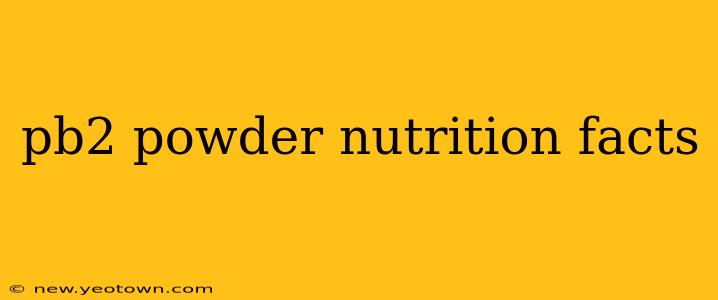Peanut butter lovers rejoice! For those seeking a healthier, lower-calorie alternative to traditional peanut butter, PB2 powder has become a pantry staple. But what exactly is PB2, and what are its nutritional benefits and drawbacks? Let's unravel the nutritional facts surrounding this popular product and answer some frequently asked questions.
What is PB2 Powder?
Imagine peanut butter, but with most of the fat and oil removed. That's essentially PB2. It's made from roasted peanuts that are ground into a powder, leaving behind a concentrated source of peanut protein and flavor. This process significantly reduces the calorie and fat content compared to regular peanut butter, making it a popular choice for those watching their weight or following specific diets.
PB2 Powder Nutrition Facts: A Closer Look
The nutritional information can vary slightly depending on the flavor and specific product, so always check the label. However, a general overview of the nutritional content per serving (typically 2 tablespoons) reveals the following:
- Calories: Significantly lower than traditional peanut butter, often around 50-60 calories.
- Protein: A good source of protein, usually around 8-10 grams per serving.
- Fat: Substantially reduced fat content compared to regular peanut butter, often less than 1 gram of fat per serving.
- Carbohydrates: Relatively low in carbohydrates.
- Fiber: A small amount of fiber is present.
- Sugar: Naturally occurring sugars from the peanuts are present, but typically low in added sugars.
Note: These are approximate values and can vary depending on the specific product and serving size. Always refer to the nutrition label on the packaging for the most accurate information.
Is PB2 Powder Healthy?
The health benefits of PB2 largely stem from its lower calorie and fat content while still providing a decent amount of protein. It can be a helpful tool for weight management and for individuals seeking to reduce their fat intake. The high protein content helps with satiety, keeping you feeling fuller for longer. However, it's not a magic bullet. While it's lower in calories and fat, it's still important to consume it in moderation as part of a balanced diet.
How Does PB2 Powder Compare to Regular Peanut Butter?
The key difference lies in the fat content. Regular peanut butter is typically high in fat (mostly healthy unsaturated fats), while PB2 significantly reduces this. This also impacts the calorie count, with PB2 having considerably fewer calories per serving. However, regular peanut butter offers a richer, creamier texture and a more intense peanut flavor. The choice depends on individual preferences and dietary needs.
Can You Use PB2 Powder in Baking?
Absolutely! PB2 powder is a versatile ingredient that can be used in various recipes. It can be incorporated into baked goods, smoothies, and even used as a coating for chicken or fish. However, it's crucial to keep in mind that it's a powder, not a creamy spread, so you may need to adjust your recipes accordingly, often adding a liquid to achieve the desired consistency.
What Are the Potential Drawbacks of PB2 Powder?
While PB2 offers many advantages, there are some potential downsides to consider. The reduced fat content means it lacks some of the healthy fats found in regular peanut butter. The texture is also different—drier and less creamy. Additionally, some individuals find the flavor to be slightly less intense than traditional peanut butter.
Is PB2 Powder Gluten-Free?
Yes, PB2 powder is generally considered gluten-free. However, it's always best to check the label to ensure that it hasn't been processed in a facility that also handles gluten-containing products and to be aware of potential cross-contamination.
Where Can I Buy PB2 Powder?
PB2 powder is widely available in many grocery stores, health food stores, and online retailers. You can easily find it at major supermarkets and online platforms.
By understanding the nutritional facts and considering the advantages and drawbacks of PB2 powder, you can make an informed decision about whether it's a suitable addition to your diet. Remember that moderation and a balanced approach to nutrition are always key.

